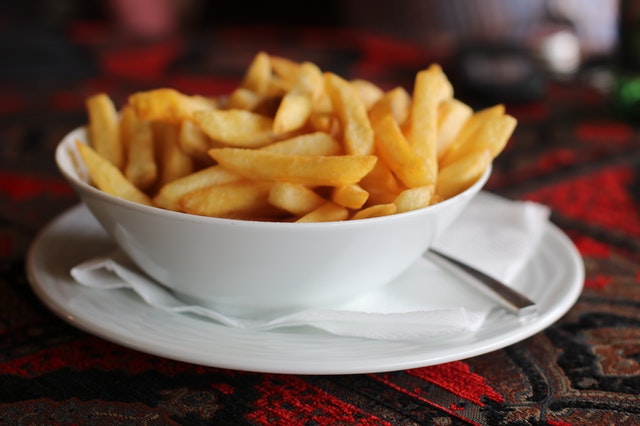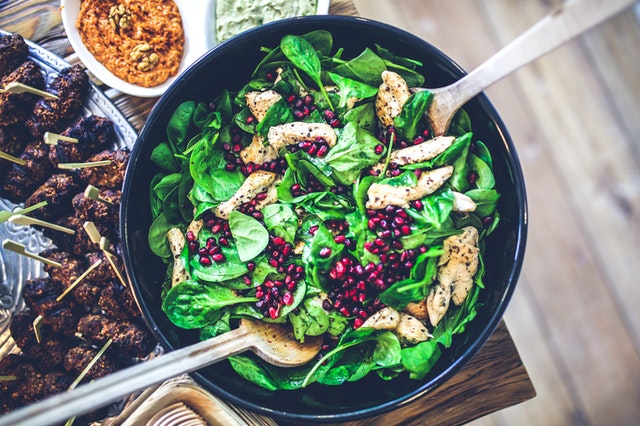
Can food affect your mood?
The junk food blues
Have you ever heard of the “junk food blues”? Well, research shows that it might be a more important warning sign than we realized. It’s obvious that you might not feel your most energetic or happy after a night of binging on ice cream, doughnuts, and chips. But how deep are the consequences really?
Scientists can peek inside our bodies and see how poor quality food affects us at a cellular level.
But in our regular day-to-day lives, it can be harder to put your finger on exactly how a poor diet impacts you. We know that junk food can lead to weight gain. But it can be harder to notice how it makes us “feel” over time. As we are finding out, it is becoming more important to take note of those changes.
At the time, I didn’t understand the important connection between food and mood. As a teenager, I lived and ate at home. My mom made a lot of home cooked meals and I didn’t eat out very much. Overall, we followed a healthy diet with plenty of exercise and playing outside. Sweets were limited and my mom really tried to instill the idea of a healthy diet in us.
“Tell me what you eat, and I will tell you what you are.”
- Anthelme Brillat-Savarin
When I moved out and suddenly had to fend for myself, my food choices were definitely not as stellar. Junk food was cheap. Frozen dinners were easy to cook after a day of school and work. I did not give much thought to how this would affect my mood. I also didn’t realize that I was creating a favourable environment for depression to take hold.

Bad food, bad mood
So much research from all over the world is pointing to a definitive link between diet and mental health. It has become such a promising field that it has inspired a whole new field of medicine called nutritional psychiatry. This field focuses on the relationship between nutrition and your mental health. I strongly believe that you can better your mental health by eating more healthy foods.

Basically, research recommends you avoid eating and drinking the following foods to better our mood.
And eat and drink more of these foods instead, to boost your mental health.

How junk food increases risk of depression
There is still a lot more research needed, but here are some basics. We do understand some of the ways in which poor quality and processed foods can increase our risk of depression.
Deficiencies
Eating a poor quality diet over a long period of time can leave you with nutrient deficiencies. So while your waistline might be expanding, your body is still not getting all the building blocks from the food that it needs to maintain its body functions. Deficiencies in vitamin B12, folate, zinc and magnesium are just a few of the common problems that eating junk food can cause over the long-term.
Not only do you end up starving the body of the important building blocks it needs to run its systems. But you are also overloading it with things it doesn’t need. This includes excess fats, dyes, preservatives, and other chemicals. So while slowing down or not being able to complete some functions because of a lack of nutrients, you’re also “gumming up the works” with extra toxins.

In our body, the brain has a very specific balance of chemicals that it needs to be at its optimal function. It’s easy to imagine how these kinds of deficiencies and interruptions can throw off the balance over time. You can get your vitamin and mineral levels tested with a simple blood test. This will give you an overall snapshot of how your diet is affecting your body.
Inflammation
Recently, more and more research is pointing to a link between depression and inflammation in the body. Inflammation is a natural response by your immune system to heal injury or infection. Swelling, redness, and tenderness all happen at a wound site because your body is sending extra healing agents to the site. When the problem is resolved, the tissue returns to normal.
But researchers are noticing that a rogue reaction of this system is happening more often, causing inflammation that doesn’t actually heal anything. The chemicals and irritants in junk food contribute to this problem. The inflammatory response is being triggered to help fight the harm these foods and chemicals are causing. Over time, it turns into permanent inflammation.
In this way, poor quality foods can cause inflammation in the body, which is another risk factor for developing depression. Specifically, this type of inflammation caused by junk food happens in the gut. And the gut-depression connection has already been proven. When the balance of good gut bacteria gets thrown off because of inflammation, you are also more susceptible to depression.
Serotonin levels
Serotonin is a chemical in the body that regulates your mood, your pain response, your impulse control and your appetite (to name a few). Low serotonin levels in the body have been linked to depression, anxiety, and many other mood disorders. Because most of the serotonin in your body is made in your intestinal tract, it makes sense that your gut health plays a major role in your emotional wellbeing.

As I mentioned, your gut is another place where a really delicate balance is needed in order for things to work right. Your body needs to get enough fiber, water and other nutrients in order to keep a healthy balance of the gut bacteria that help digest and absorb your food.
If this balance is disrupted by the chemicals and irritants from poor quality food, it won’t be able to digest your food or produce serotonin properly. If that situation stays out of balance for a long time, you will feel the long term effects of low serotonin levels and poor digestion. In this way, you are slowly paving the way for lower mood by eating an unhealthy diet.

So, how should you approach food?
The good news is, that while the link between junk food and mood disorders is pretty clear, this is also a major opportunity for treatment. Studies have shown that switching to a cleaner, plant-based diet can significantly improve depression symptoms over time. The body is really resilient and can correct imbalances and damage if you feed it the right building blocks to heal.
When you're dealing with depression, diet can be a hard area to make changes. When I was suffering from depression, I started to have even more cravings for unhealthy comfort foods. I also had no energy or motivation to plan meals ahead to cook for myself. Yet I knew that a lot of research showed that it was a really important part of getting better.

Because I felt easily overwhelmed, I started slowly. For example, by bringing home an apple instead of the chocolate bar. And every time I made a healthier choice I felt a bit of pride and achievement. And that helped keep me going. Maybe ask a supportive friend or family member to help you cook a few meals to freeze so you don’t have to cook every night. I also had my doctor run a blood panel for me to test for nutrient deficiencies. This helped me find the right vitamins and supplements I needed to fill in the gaps my diet was leaving.
In the end, I think changing my food played a major part in healing my depression. It’s not a miracle bullet. I spent several years slowly increasing the amount of junk food I ate, so I was aware it was going to take some time to undo the damage and feel the positive changes. But for me, it was really worth making the effort.

The Takeaway
I now know many people who have worked their way out of depression with diet. And while a change in diet alone will not work for everyone, it is too important to leave it out of the equation. We know there is a link between an unhealthy diet and depression. We also know there is a link between gut health and depression.

Putting this knowledge to work, it is clear that what we eat can affect how we feel. It is much easier to buy frozen food. Or snack on sugary or salty junk when we feel hungry. And when I was depressed, my life was all about easy. I was simply not able to make healthy decisions about food.
I did not have the energy to pour over recipes and plan out a meal plan.
In fact, I was quite happy with myself if I actually managed to eat any food at all. Sometimes I was too exhausted to even do that. So, I completely understand that “healthy diet” might seem like something from another universe right now. The thought of having to cook for yourself might cause you anxiety and nightmares.
However… a healthy diet might make the difference between drowning in depression and finding a way out of it. And I think it’s even more difficult to know the answer and not be able to do anything about it. So, the most important thing is that you actually get started on changing your diet.
Baby food steps
There are a few things you can do to set this change in motion. If you feel up to it, you can choose one healthy thing and eat it. This might be an apple or a carrot. Or it might be something bigger like a small bowl of home-cooked oatmeal with a little bit of fruit. If you feel really adventurous, maybe a bowl of whole-grain pasta with a simple tomato sauce (not out of a can).
Every day, you can make the conscious choice to choose one healthy food. And then reward yourself with your favorite TV show or your favorite song. Just make sure you are not rewarding yourself with any junk food.

And if you are not able to do this yet, enlist the help of family, friends, a therapist, or a food (nutrition) coach. They will be able to hold you accountable for the one healthy food per day. They might also be able to help you pre-cook and freeze healthy meals. Maybe they can even deliver some food to you a few times per week to get started. Whatever works. Just make sure you start one baby food step at a time.
You deserve to shine and find your way out of depression to live a full life!
Sources
https://www.health.harvard.edu/blog/nutritional-psychiatry-your-brain-on-food-201511168626
https://www.ncbi.nlm.nih.gov/pmc/articles/PMC2738337/
